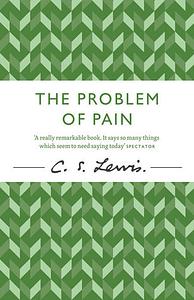Take a photo of a barcode or cover
This was quite a thought-provoking book for me, but as always, C.S Lewis’ theology has to be packed with so much well-thought out arguments arranged in a very logical approach, there is always a thing or two to take from his books. I wouldn’t want to go into profound theology in reviewing and summarizing this book as it would make it too lengthy and somewhat boring, so I decided to briefly review it in the simplest way possible, particularly from Chapters 2~8.
In this book, C.S Lewis tackles one of the most challenging questions in Christianity, “Why is there pain in this world?”
He writes, “If God were good, He would make His creatures perfectly happy, and if He were almighty, He would be able to do what he wished. But the creatures are not happy. Therefore, God lacks either goodness, or power, or both.”
He goes on to address this as the Problem of Pain. Happiness in believers is being in a place where God wants you to be, anything apart from that ought to bring unhappiness and as you might guess, pain as well.
So where then did this desire of not wanting to be where God wants humans to be come from? That is defined by the Doctrine of Human Fall, men have drifted apart from God because of the abuse of FREE WILL.
As Lewis puts it;
Origins of wickedness were in people thinking that there is no problem with using their free will to be wicked and there are two causes of this:
1. Mistaking kindness for goodness, that being good is simply a mere act of kindness.
2. Doctrine of repressions and inhibitions, i.e our vices are natural, so as to overcome the guilt that comes with it.
Furthermore, Lewis goes on to explain the effects of the Human Fall. He talks about how God ruled the human organism through the human’s spirit, but that when the spirit disobeyed Him, He ceased to rule the human organism. As a result, it became hard to fully surrender to God, so the human organism had to go through the process of mortification, which in itself brings in pain. So, the purpose of pain according to Lewis is for you to notice something needs to be attended to i.e, alerting you that you have drifted away from your God.
Particularly useful is Lewis’ explanation on how pain differs from sin. He explains how sin can recur as long as the original temptation continues, so does evil (error breeds error), whereas pain can’t proliferate. When pain is over, it is over, and it brings in joy. Furthermore, an undoing is required to make error and sin right whilst pain has no undoing, you just have to heal whatever caused it. I addition, sin and error negatively affect people around you, but pain has one good effect to people who witness you going through it, pity.
I read this book before Mere Christianity, and now that I am currently reading Mere Christianity, I have realized that it would have been a smoother read if I had read Mere Christianity beforehand. Not that the two books are directly related, but Mere Christianity contained some basic theories and more detailed explanations which Lewis brought up in The Problem of Pain without explaining it in as much depth as in Mere Christianity. I would definitely recommend reading Mere Christianity before this book.
In this book, C.S Lewis tackles one of the most challenging questions in Christianity, “Why is there pain in this world?”
He writes, “If God were good, He would make His creatures perfectly happy, and if He were almighty, He would be able to do what he wished. But the creatures are not happy. Therefore, God lacks either goodness, or power, or both.”
He goes on to address this as the Problem of Pain. Happiness in believers is being in a place where God wants you to be, anything apart from that ought to bring unhappiness and as you might guess, pain as well.
So where then did this desire of not wanting to be where God wants humans to be come from? That is defined by the Doctrine of Human Fall, men have drifted apart from God because of the abuse of FREE WILL.
As Lewis puts it;
Origins of wickedness were in people thinking that there is no problem with using their free will to be wicked and there are two causes of this:
1. Mistaking kindness for goodness, that being good is simply a mere act of kindness.
2. Doctrine of repressions and inhibitions, i.e our vices are natural, so as to overcome the guilt that comes with it.
Furthermore, Lewis goes on to explain the effects of the Human Fall. He talks about how God ruled the human organism through the human’s spirit, but that when the spirit disobeyed Him, He ceased to rule the human organism. As a result, it became hard to fully surrender to God, so the human organism had to go through the process of mortification, which in itself brings in pain. So, the purpose of pain according to Lewis is for you to notice something needs to be attended to i.e, alerting you that you have drifted away from your God.
Particularly useful is Lewis’ explanation on how pain differs from sin. He explains how sin can recur as long as the original temptation continues, so does evil (error breeds error), whereas pain can’t proliferate. When pain is over, it is over, and it brings in joy. Furthermore, an undoing is required to make error and sin right whilst pain has no undoing, you just have to heal whatever caused it. I addition, sin and error negatively affect people around you, but pain has one good effect to people who witness you going through it, pity.
I read this book before Mere Christianity, and now that I am currently reading Mere Christianity, I have realized that it would have been a smoother read if I had read Mere Christianity beforehand. Not that the two books are directly related, but Mere Christianity contained some basic theories and more detailed explanations which Lewis brought up in The Problem of Pain without explaining it in as much depth as in Mere Christianity. I would definitely recommend reading Mere Christianity before this book.
This was a very well-written and thought-provoking book. I appreciated how even though some of the points CS Lewis made could have been summed up in a few sentences, he took care to logically prove and explain all of those points. It was also interesting to see how some of the the ideas brought up in this book reminded me of plot or character elements of his Narnia series.
Like with all of the CS Lewis books I have read so far, I am eager to reread it with a physical copy and make annotations and highlight things I want to remember in everyday life. While this wasn’t my favorite of his works, and could be a bit dense at times, I enjoyed learning from it, and I can see value in it.
Like with all of the CS Lewis books I have read so far, I am eager to reread it with a physical copy and make annotations and highlight things I want to remember in everyday life. While this wasn’t my favorite of his works, and could be a bit dense at times, I enjoyed learning from it, and I can see value in it.
challenging
hopeful
inspiring
reflective
medium-paced
3.5 Stars
The problem with this Lewis book, The Problem of Pain, is that it's hard to read andsometimes oftentimes, hard to understand. Hahaha!
Fortunately, this is not my first non-fiction of Lewis, or I might have not finished reading it. And as with any other Lewis, you don't read itby viewing it as a jargon as it is, a collection of words, with the aid of a dictionary or a thesaurus. But you read it on the whole context. Otherwise, you'd miss out on the message that CSL wants to deliver.
And again, as with any other Lewis, to advertise/recommend his works, it's helpful to share a few words from the book:
But if suffering is good, ought it not to be pursued rather than avoided? I answer that suffering is not good in itself. What is good in any painful experience is, for the sufferer, his submission to the will of God, and, for the spectators, the compassion aroused and the acts of mercy to which it leads.
From the Appendix:
When short, severe, physical pain passes it leaves no obvious alteration in behaviour. Long-continued pain has more noticeable effects. It is often accepted with little or no complaint and great strengths and resignation are developed. Pride is humbled or, at times, results in a determination to conceal suffering.
The problem with this Lewis book, The Problem of Pain, is that it's hard to read and
Fortunately, this is not my first non-fiction of Lewis, or I might have not finished reading it. And as with any other Lewis, you don't read it
And again, as with any other Lewis, to advertise/recommend his works, it's helpful to share a few words from the book:
But if suffering is good, ought it not to be pursued rather than avoided? I answer that suffering is not good in itself. What is good in any painful experience is, for the sufferer, his submission to the will of God, and, for the spectators, the compassion aroused and the acts of mercy to which it leads.
From the Appendix:
When short, severe, physical pain passes it leaves no obvious alteration in behaviour. Long-continued pain has more noticeable effects. It is often accepted with little or no complaint and great strengths and resignation are developed. Pride is humbled or, at times, results in a determination to conceal suffering.
informative
challenging
informative
reflective
medium-paced
CS Lewis is perhaps my favorite theologian since the Apostle Paul. While not a long book, there is a lot of meat to digest here on the concept of pain and its' place in human existence.
challenging
dark
informative
inspiring
reflective
slow-paced
challenging
emotional
informative
reflective
fast-paced
5/5 Stars. This is not a book for the faint of heart. The reader needs to possess the ability to press on through Lewis’s logic - which is eloquently succinct and yet feels to go on endlessly as Lewis responds to so many “but what if” arguments on suffering. Even still, pushing through simply led me to come even more face to face with my own humanity.
The ideas presented in this book will, I imagine, continue to haunt me as I continue my wrestling of “why does God allow suffering?” And “Why is the answer to all that God has for me to submit to His will instead of my own”.
If you are looking for answers, I would encourage you to read this book with caution. I have found answers, I think I simply have to face that though I know they are true, I wish the answer was different.
The ideas presented in this book will, I imagine, continue to haunt me as I continue my wrestling of “why does God allow suffering?” And “Why is the answer to all that God has for me to submit to His will instead of my own”.
If you are looking for answers, I would encourage you to read this book with caution. I have found answers, I think I simply have to face that though I know they are true, I wish the answer was different.



